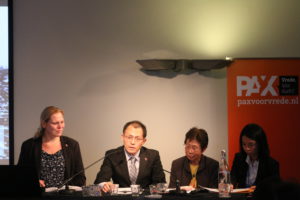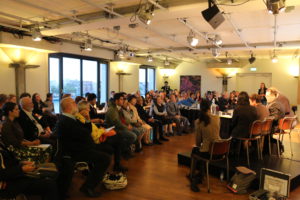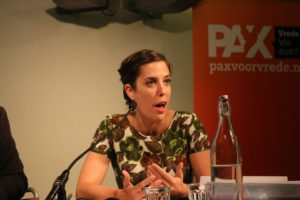It is now more than 71 years ago that atomic bombs were dropped on the Japanese cities of Hiroshima and Nagasaki. The people who survived these horrific events still deal with the consequences in everyday life. On Thursday, October 6, a few survivors (hibakusha) came to Amsterdam. PAX, Peace Boat and Tribunaal voor de Vrede organised an evening in Pakhuis De Zwijger to allow people to listen to the story of a Nagasaki bombing survivor and to discuss the impact of nuclear weapons and efforts on nuclear disarmament today.
Door David Kwaadgras*
The evening was moderated by Susi Snyder, the Nuclear Disarmament Programme Manager for PAX in the Netherlands. Akira Kawasaki of Peace Boat talked about the activities of his organisation, Peace Boat, and the impact of nuclear weapons. Peace Boat is a Tokyo-based NGO which is organising an international cruise with survivors of the nuclear bombings on Hiroshima and Nagasaki. They visit various countries to talk about their experiences and to raise awareness of the humanitarian consequences of nuclear weapons. When, the bombs were dropped on Hiroshima and Nagasaki, tens of thousands of people were killed instantly and many more died as a result of the horrific after-effects of the bombings. As of today there are still thousands of nuclear weapons in the world, many of them on ‘hair-trigger alert’ (ready to fire). The international regulations on nuclear weapons differ from those on other weapons of mass destruction. Biological and chemical weapons are categorically banned, but this is not the case with nuclear weapons.

No more Hiroshima, no more Nagasaki
After Mr. Kawasaki’s talk, Ms Toyoko Tagawa, who was six years old when an A-Bomb fell on Nagasaki, talked about her experience. When the bomb was dropped, she herself was far about 9 kilometres away from the hypocentre. However, her older brother, a medical student, was only 500 meters away from the centre of the blast. He suffered grave injuries and died a few days later in terrible pain. Ms Tagawa’s mother would afterwards always blame herself that at that critical moment she hadn’t had any ice to alleviate his burning. A photo of Ms Tagawa’s brother, a boy of about 16 years old, was shown on a big screen. After her impressive story Ms Tagawa answered a few questions from the listeners. Ms Tagawa underwent several surgeries in her life because of the effects of radiation, and at times she needed a lot of perseverance to keep on living. This trip is the first time in her life she has been outside of Japan. She was happy to be in the Netherlands, because of all the water and the historical connection between Nagasaki and Dutch traders. The hibakusha share their experiences with the world because they are convinced that no one should ever again have to experience what they went through .
Following Ms Tagawa’s talk there was a short break, because she and the other hibakusha had to leave for IJmuiden, where their ship was waiting to bring them to their next destination: New York.

Nuclear weapons and International Humanitarian Law (IHL)

After the break Mirjam de Bruin of the Netherlands Red Cross talked about the position of her organisation on nuclear weapons in the context of international humanitarian law (IHL). The Red Cross does not take a political stance on the question of a ban, but rather explains why the use of nuclear weapons is a violation of IHL. After Mirjam de Bruin’s talk Susi Snyder explained why and how PAX is working to effect a worldwide ban on nuclear weapons. Recently a breakthrough was reached when 107 governments supported a UN Conference in 2017 on the creation of a legal instrument to prohibit nuclear weapons. After Susi Snyder’s concluding talk people in the room could ask questions or bring in points of discussion, for example on ways in which a ban on nuclear weapons could be enforced. It was good to see many well informed and engaged participants during this ‘open mic’ stage. The impressive and informative evening was concluded around 20:30 with a drink and a snack for all attendants.
* David Kwaadgras is a Slavist and a translator and is volunteer at PAX
What can I do?
Later this month, the UN General Assembly is expected to pass a resolution calling for the negotiations on a treaty banning nuclear weapons to begin in 2017. When it does, it will make history, bringing a global nuclear weapons ban a step closer to becoming reality. Send Minister Koenders, Dutch Minister of Foreign Affairs, an encouraging message and ask him to vote ‘yes’ on the UN resolution calling to start the negotiations on an international treaty banning nuclear weapons!
More information
Click here for more information about Peace Boat. Here you can find more information on Tribunaal voor de Vrede. Read here why the Netherlands Red Cross is calling for an international treaty banning nuclear weapons. Read here more on the UN resolution that will bring a global nuclear weapons ban a step closer to becoming reality.
